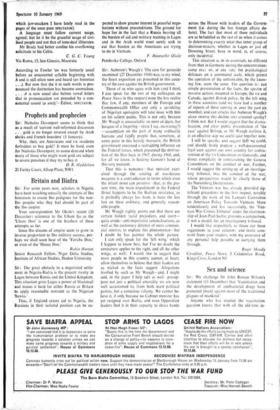Sir: Auberon's Waugh's The case for genocide examined' (27 December
1968) was, to my mind, the finest exposition yet presented in this coun- try of the case against the British government.
Those of us who agree with him (and 1 think I can speak for the rest of my colleagues on Peace News in this respect) none the less realise that few, if any, members of the Foreign and Commonwealth Office and only a sprinkling of Nigerian apologists will take issue with him on his salient points. This is not only because Mr Waugh is unassailable on most of-them, but hoe-apse of a lingering—(dare 1 say, increasing?) —assuntption on the part of many ordinarily humane and kindly people that, somehow, at some point in this beastly.massacre, the British government exercised a restraining influence on the Federal forces, which prevented the destruc- tion of the Ibos back in 1967, during 1968, and, for all we know, is holding Gowon's hand at this very moment.
That this is nonsense—that restraint exer- cised through the. sending of murderous weapons is a contradiction in terms which even the infant mind can perceive—that, at the pre- sent time, the main impediment in the Federal thrust happens to be the Biafran resistance, as it probably always has been, is none the less lost on these ordinary, and generally reason- able people.
Mr Waugh rightly points out that there are certain hidden racial prejudices, and overt— quite crude—anti-imperialist rationalisations, as well as the customary defence of mere commer- cial interest, to explain this phenomenon—but I doubt he has painted the whole picture.
I can only speak for the 'left wing,' which I happen to know best, but I've no doubt the conjecture applies to the right, and all the other wings, as well: I would like to suggest that most people in this country cannot, at heart, allow themselves to believe that their leaders are as wicked as the facts suggest. Allegations levelled by such as Mr Waugh—and, I might add, in the paper I help edit as well—presup- pose not just a political amorality we are now well accustomed to, from both main political parties, but a conscious villainy. We cannot be- lieve it, if only because no Cabinet minister has yet resigned over Biafra, and even Opposition leaders find it in their capacity to shake hands across the House with leaders of the Govern- ment (i.e. during the last foreign affairs do- bate). The fact that most of these individuals are as befuddled as the rest of us when it comes to determining exactly what that inner group of decision-makers, whether in Lagos or just off Downing Street, have in mind, is, of course, only incidental.
This situation is, in its essentials, no different
from that in Germany during the concentration- camp era: or, at any rate, the psychological defences on a communal scale, which permit the operation of the unthinkable, by the know- ing few, seem the same. The question is: can simple presentation of the facts; the spectre of massive actions mounted in Europe, the us and Canada, against British policy, by the left wing in these countries (and we have had a number of reports of these coming in. over the past six months); and can 'articles like Auberon Waugh's alone reverse this decline into criminal apathy? 1 think not. But I would suggest that the drama- tisation, and clear public presentation of 'the case' against Britain, as Mr Waugh outlines it, is an effective step we could take together now.
1 will be specific, and suggest that we could, and should, firstly prepare a well-documented legal case against our own country for contra- vention of the UN Convention on Genocide, and direct complicity in contravening the Geneva Conventions on the conduct of war. Further, I would suggest the setting-up of an investiga- tory tribunal, into the conduct of the war, whose perspectives would be clearly those of the Nuremberg Declarations.
The Vietnam war has already provided sig- nificant precedents in the first respect, notably through the work of the Lawyers Committee on American Policy Towards Vietnam. More tendentiously and less successfully, the 'Viet- nam War Crimes Tribunal' under the chairman- ship of Jean-Paul Sartre. provides a comparison, if not a model, for an investigatory tribunal.
1 would like respectfully to throw out these
suggestions in your columns. and invite com- ment from your readers, with my assurance of any personal help possible in carrying them through.
Roger Moody
Co-editor, Peace News, 5 Caledonian Road, Kings Cross, London NI


































 Previous page
Previous page